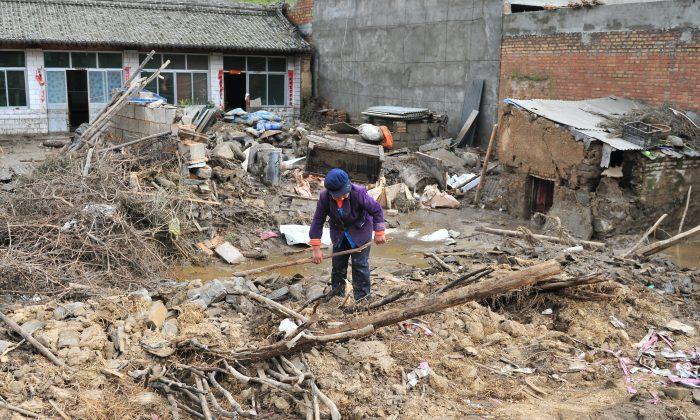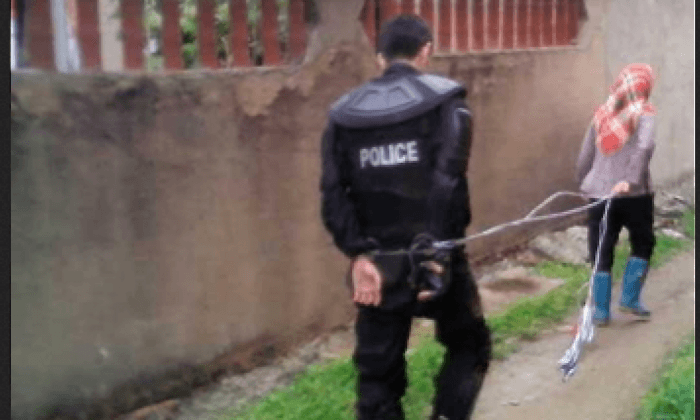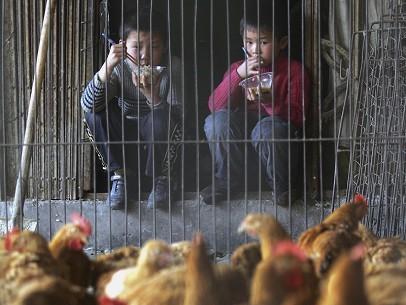Villagers in southwestern China’s Yunnan Province are demanding that Chinese authorities re-investigate what triggered last Friday’s landslide that killed 46 people in a village, suggesting that a nearby coal mine explosion caused the disaster, rather than heavy rainfall.
If the villagers’ accusations are true, the incident will be yet another black mark on China’s coal mining industry—the deadliest in the world.
Last Saturday, an official disaster response team commissioned by the local government of Yunnan, a mountainous and relatively poor province, blamed the landslide on snow and rain, while ruling out that a coal mine blast was the cause, reported state-run media.
This week, at least 72 people from the disaster-hit village of Gaopo signed a petition to send to the State Administration of Coal Mine Safety and the Ministry of Land and Resources, demanding another investigation into the matter.
“Why did local governments at all levels determine the nature of this Gaopo disaster to be a natural disaster?” asked a villager who spoke to Sound of Hope Radio. “Because the Gaopo mines have concealed their dirty tricks—all officials have gained profits from the mining, even minor village cadres have their cars, while the villagers are in the throes of poverty.”
A family member of one of the victims, who used the alias Zhao Yuanxin, told The Epoch Times there was no evidence that heavy rain and snow saturated the slope, subsequently causing the landslide. Before the landslide, Zhao said villagers heard a loud explosion, saw black smoke pouring out of the top of a nearby mountain, and noted there was a U-shaped hole in the side of the mountain. Large amounts of earth and rocks tumbled out from the hole.
“Experts said the continuous rain and snow caused the accident,” Zhao said. “That’s not true. There was only a thin layer of snow over the two days [leading up to the landslide]. Even the 50-day-long snowstorm that took place in 2008 caused no landslide. Our grandfathers and fathers never recalled any landslides here in the past,” Zhao said.
Zhao contended that Yunnan’s investigators did not conduct a “through investigation” before ruling out that a coal mine blast is the cause of the landslide.
“We won’t believe such a hasty conclusion,” Zhao said. “Zhenxiong County Gaopo Coal Industry Co., Ltd. has operated several coal mines in Gaopo, which are barren and empty. They also failed to provide a reasonable explanation for the explosion.”
Another Gaopo villager, who used the alias Zhao Min, said he also heard a large explosion before the disaster. “Maybe a gas explosion took place underground. Otherwise, what else could possibly push out such a large amount of rocks and other debris?”
In recent years, China has become ever more dependent on coal power to fuel its economic boom, becoming the world’s largest consumer of the energy source. But coal’s rise has caused major problems, including environmental destruction and frequent coal mining disasters.
In 2011, around 2,000 coal workers were killed in mine-related disasters, usually triggered by explosions.
Investigator Jiang Xingwu also told the Jinghua Times that his team did not actually go into the mine during the investigation before producing the report.
Anding credibility to the villagers’ claims is the report that a miner calling himself Wang Xiang, who worked in mines near Gaopo for five years and “knows every bit of detail about mining there,” said that he was “absolutely certain” the “landslide occurred at an empty mine,” according to an interview he gave with the Beijing News. “Originally there was coal in there, then it was all mined out.”
The landslide and its apparent cover-up drew condemnation on Chinese blogs.
Sina Weibo user “Wang Wanshou,” who is from nearby Zhaotong City, said that it is evident that “it is not a [natural] disaster.” Wang added: “The debris slid down from the top of the mountain … for those who died, we want the truth.”
Blogger “Tian Yingjun” called on local authorities to reveal the source of the landslide.
“Please do not bury the truth with the dead!” Tian pleaded. “Corpses can be cremated, but the truth cannot be buried.”
Read the original Chinese article.
The Epoch Times publishes in 35 countries and in 21 languages. Subscribe to our e-newsletter.


